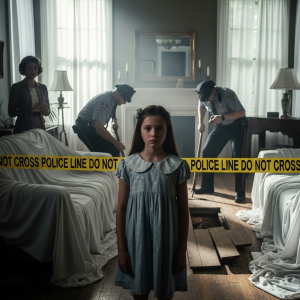I should have seen it coming. The signs were all there, not in thunderous cracks, but in hairline fractures, nearly invisible on the surface of our wedding china. For forty-three years, I had been married to Frank Patterson, a man who moved through our life with the unquestioned, benevolent authority of a king in his castle. And I, Dorothy, his queen, had long ago accepted that my primary role was to maintain the peace, even if it meant sacrificing pieces of myself, one small, silent surrender at a time.
That evening had begun like a thousand others before it. The day’s labor had been a quiet ritual, a meditation in service of a man who no longer noticed the effort. I’d spent hours preparing his favorite meal—a pot roast, slow-braised with root vegetables until the meat was meltingly tender and the aroma filled every corner of the house. This was the scent of home, a scent I had curated for decades.
I set the grand dining room table, the one we only used for special occasions or when the children visited. I carefully laid out the Lenox china I had chosen with such hope as a young bride, my head once full of silly, romantic dreams of elegant dinner parties and sparkling, witty conversation. Those dreams had died a slow, quiet death somewhere between Frank’s third nightly beer and his first casual, cutting criticism of the gravy.
Lisa, my daughter-in-law, arrived at six o’clock sharp. She swept into the house without knocking, as was her custom, her presence a whirlwind of expensive perfume and implicit judgment. She had married my son, Michael, twelve years ago, and from the very first day, she had viewed me as an outdated relic, a quaint antique to be tolerated, perhaps even pitied, but never, ever taken seriously.
“Dorothy, honestly, you didn’t need to go to all this trouble,” she’d said, her eyes scanning the perfectly set table with an expression that suggested I had, in fact, gone to far too little trouble. “We could have just ordered some trendy takeout. It would have been so much easier on you.”
My granddaughter, fifteen-year-old Katie, trailed in behind her. She offered a mumbled, distracted, “Hey, Grandma,” her eyes and thumbs glued to the hypnotic blue glow of her phone screen, before slumping dramatically into her designated chair. I tried to remember the last time she had run to hug me upon arrival. The bright, gap-toothed, joyful smile of her childhood had been replaced by a studied, teenage indifference, an attitude subtly and expertly encouraged by her mother’s whispered asides about grandmothers who “tried too hard.”
Frank was already at the head of the table, halfway through his second bottle of beer. The condensation left a ghostly, wet ring on the polished mahogany surface. He never used coasters. I had stopped asking him to years ago. Peace, I had convinced myself, was more valuable than furniture. It was a mantra I had repeated until I almost believed it.
Dinner was a monologue, starring Lisa. The narrative was, as always, a glowing review of her own life. Her recent promotion at the marketing firm, her ambitious plans for a full kitchen renovation, the staggering cost of Katie’s grades at the prestigious private school Frank and I quietly helped pay for. I played my part, the supporting actress in the drama of their lives. I asked the right questions, feigned the appropriate level of interest, and embodied the supportive, smiling matriarch I was expected to be.
Frank, meanwhile, began his own familiar performance. It was a litany of small complaints, each one a tiny, targeted dart aimed at me. The house was too cold. The meat, which I had tended to for hours, was a little dry on the edges. I had used too many dishes in the preparation, creating more work for myself. Each criticism was a small paper cut, insignificant on its own, but together, over the course of four decades, they had bled me of my spirit.
“Mom always tries so hard,” Lisa chimed in, her voice pitched in that signature tone of hers—a sound that mimicked sympathy but dripped with condescension. “It’s sweet, really. So very… traditional.”
Traditional. That was her word for me, her label, her box. My cooking, my decorating, my opinions on the news, my very way of being—all of it was dismissed with that single, damning adjective. In Lisa’s sleek, modern world, “traditional” was just a polite synonym for irrelevant.
Katie giggled at something on her phone, a sudden, sharp burst of sound. Lisa leaned over, her perfectly highlighted hair falling over her daughter’s shoulder as she peered at the screen. They both erupted into a private, shared moment of mirth, a secret world to which I had no password. Frank joined in, his booming laugh echoing theirs, though he had no idea what the joke was. He was simply happy to be included in a circle that, by its very nature and design, had to exclude me.
That is when I made my fatal mistake. After a lifetime of knowing better, I tried to bridge the gap. I tried to enter their world.
“What’s so funny over there?” I asked, a genuine, hopeful curiosity in my voice. It was a foolish, tender shoot of a question in a barren landscape.
Frank turned to me, and his face settled into a mask of weary impatience, an expression I knew as well as my own reflection. It was the look he reserved for me when my very existence, my very breath, had become tiresome to him. “Dorothy, you wouldn’t get it,” he slurred slightly, the beer dulling the edges of his words. “It’s a generational thing. A meme.”
“Some jokes just don’t translate across the ages,” Lisa added, her smile a masterpiece of saccharine pity.
A hot, painful flush of embarrassment crept up my neck, but I pushed on. Maybe it was the single, delicate glass of wine I’d allowed myself, or maybe it was the cumulative, crushing weight of forty-three years of being gently, persistently, and lovingly erased. “Try me,” I said, my voice quiet but firm. “I might surprise you.”
That’s when Frank’s hand closed around the stem of his wine glass. It was full of the expensive Cabernet I had chosen specifically for the occasion. His hand was unsteady, a tremor of pure, unadulterated irritation running through it. He looked at me, his eyes filled with an annoyance so profound it was almost breathtaking.
“You want to know what’s funny, Dorothy?” he said, his voice rising, capturing the full attention of the table. “What’s funny is watching you sit here, pretending you have anything relevant to contribute to this conversation. That’s what’s funny.”
And then, with a deliberate, almost theatrical slowness, he tilted the glass.
The dark red wine cascaded over my head in a shocking, cold torrent. It felt like a violation. It soaked my carefully styled silver hair, ran in sticky, humiliating rivulets down my face, and bled into the cream-colored silk blouse Frank had once, a lifetime ago, told me made me look elegant.
The silence that followed was absolute, a vacuum lasting only three seconds before it was shattered by Lisa’s high, sharp peel of laughter. Katie joined in a moment later, her teenage giggle a cruel, thoughtless harmony to her mother’s overt amusement. Even Frank chuckled, a low, rumbling, satisfied sound, as if he had just performed the most brilliant and witty comedic act of his life.
I sat there, frozen, with wine dripping from my chin onto my lap. In that moment, I felt the full weight of my seventy-one years settle into my bones like lead. This dining room, the stage for a lifetime of family memories—birthdays, holidays, anniversaries—suddenly felt like a courtroom where I had just been sentenced for the crime of being old and in the way.
My reaction was not born of thought, but of an instinct I didn’t know I still possessed. Without a word, I took my heavy linen napkin and calmly, deliberately, began to wipe the wine from my face. I folded the now-stained cloth and placed it precisely beside my plate. Then, I stood up. The scrape of my chair against the hardwood floor was the only sound I made, and it was loud enough to finally silence their laughter.
“Dorothy, oh my god,” Lisa managed between her last gasps of laughter. “You should see your face. It’s priceless.”
I ignored her. I walked out of the dining room, my back straight, my head held high. I went to the front hall closet and retrieved my purse and my coat. No one moved to stop me. No one spoke a word. They just watched, their faces a mixture of confusion and lingering amusement. I opened the heavy front door and stepped out into the cool, cleansing evening air. The wine was already starting to make my scalp itch.
I walked down the familiar stone path, past the rose garden I had planted and tended for four decades, and I did not look back.
Ten minutes later, I was sitting in my car in the sterile, fluorescent glare of a grocery store parking lot. My phone buzzed in my purse. It was Frank. For a fleeting, foolish moment, a flicker of a forty-three-year-old habit, I thought he was calling to apologize.
His voice was not apologetic. It was a frantic, panicked whisper. “Dorothy, you need to come home. Right now. There are three men here. They’re wearing suits. They say they’re lawyers. They’re talking about the house. Dorothy, what the hell did you do?”
I hung up the phone, my hand trembling slightly. Lawyers. The house. None of it made sense. Frank had handled all the paperwork, all the finances, for our entire marriage. I just signed where he pointed his finger, my trust in him as absolute and unquestioning as the tides.
The phone rang again, insistent. I answered. “Dorothy, for God’s sake, pick up!” Frank’s voice was stripped of all its earlier bluster. “These men are saying you own the house. That it’s been solely in your name this whole time. That’s impossible! I made every single mortgage payment!”
A strange, cold curiosity began to unfurl within me, pushing aside the humiliation and the hurt. “Did they show you any documents, Frank?” I asked, my voice surprisingly steady.
“Yes! The original deed from 1980! It says ‘Dorothy May Patterson, as sole owner.’ You have to come home right now and tell them there’s been a mistake!”
I hung up again and turned off my phone. Dorothy May Patterson. My maiden name. A ghost from a past life, a girl I barely remembered. Why would the house be in my name? Frank controlled everything. I didn’t even have my own checking account.
When I finally pulled onto our street, a sleek black sedan was parked in our driveway. Through the large picture window, I could see the silhouettes of three men in dark suits and a frantic, pacing Frank. I walked up the path to my front door, and before I could even ring the bell, he yanked it open.
“Dorothy, finally! You need to clear this up right now.” He pulled me inside, not even noticing my wine-stained hair and blouse.
The oldest of the three men, a distinguished figure with silver hair and kind eyes behind gold-rimmed glasses, stepped forward. His presence was a pool of calm in the frantic energy of the room. “Mrs. Patterson, my name is Jonathan Blackwood, from the firm Blackwood, Sterling, and Associates. We apologize for the intrusion, but we were acting on long-standing instructions to contact you if certain circumstances arose.”
“What circumstances?” I asked, my voice a near whisper.
“Any attempts to formally modify the ownership, or any inquiries made to question your sole possession of this house.”
Frank interrupted, his voice strained and high-pitched. “Listen, I think there’s been a terrible misunderstanding. I bought this house. I paid for it.”
“Mr. Patterson,” one of the other lawyers, a sharp-looking man named Mr. Martinez, said, opening a leather-bound folder. “You made payments to the bank, yes. But you made them as a tenant, not as the owner.”
The silence in the room was absolute. Tenant. The word hung in the air, utterly alien.
“Mrs. Patterson,” the third lawyer, a younger man named Mr. Chen, asked me directly. “When this house was purchased in 1980, can you recall who provided the funds for the down payment?”
The memory was hazy, shrouded in the thick fog of grief and the chaos of new motherhood. My beloved parents had been killed in a car accident just six months after my son, Michael, was born. Frank, my strong, capable husband, had handled everything.
“The down payment, a substantial one, came from the inheritance you received after your parents’ tragic passing,” Mr. Blackwood said gently, as if reading my mind. “Our firm handled their estate. We sold their property in Ohio and used the entirety of the funds for the purchase of this house. Your parents’ will contained a very specific, very protective clause: any property purchased with their inheritance was to be exclusively and inalienably in your name, with no current or future spouse having any legal claim.”
Frank had turned a ghostly white. He looked as if he might faint. “This is ridiculous! We’ve been married for forty-three years!”
“The law is quite clear regarding the protection of inherited assets, Mr. Patterson,” Mr. Blackwood stated, his tone unwavering. “Especially when the original will contains such specific and legally binding protective clauses.”
Lisa, who had been watching the entire exchange from the kitchen doorway with wide, calculating eyes, finally found her voice. “Wait a minute. You’re saying that Dorothy owns this house? The whole thing? Outright?”
“Precisely. And it has been that way since the deed was signed in 1980.”
I looked around the room—at Frank’s oversized leather recliner, at Lisa’s modern, minimalist art on the walls, at a house filled with their choices, their tastes, their rules—and I felt the very ground shift beneath my feet.
“Why are you here now?” I asked, my voice finding a new strength. “After all this time?”
“Because someone,” Mr. Chen said, looking pointedly at Frank, “made a formal inquiry with the county clerk’s office last week about the process of transferring the ownership of this property into a family trust.”
“We were just exploring options for the future!” Frank blurted out, sweating now. “To help Michael and Katie down the line!”
“Without consulting me,” I stated, the words feeling foreign and powerful on my tongue.
“You don’t understand these complicated financial things, Dorothy!” he snapped, his old habits of condescension dying hard. “I was protecting you! I’ve always protected you!”
Mr. Blackwood cleared his throat, drawing all attention back to him. “Mrs. Patterson, there is something else. Your parents included another provision in their will. It is something we at the firm have come to call a ‘dignity clause.’ They instructed us to present you with this”—he pulled a sealed, yellowed envelope from his briefcase—“if you ever felt your position, your safety, or your dignity were threatened or disrespected in your own property.”
Frank let out a nervous, hollow laugh. “Disrespected? Don’t be absurd! She’s perfectly fine!”
I looked directly at him, the memory of his booming laughter as the red wine ran down my face still fresh and stinging. “Actually,” I said, my voice dangerously calm. “I believe I would like to hear more about that clause.”
“It is quite straightforward,” Mr. Blackwood said, his gaze compassionate. “If you choose to invoke it, you have the immediate and indisputable legal right to exclusive possession of this property. By law, anyone else currently residing here would be considered a tenant and would have thirty days to vacate the premises.”
Thirty days. Frank collapsed onto the sofa as if his legs had given out.
But the revelations were not over. “Mr. Patterson,” Mr. Martinez said, consulting another document in his folder. “There’s also the matter of the mortgage payments you’ve been making. According to our records, this house was fully paid for, free and clear, in 1987.”
A suffocating silence fell over the room.
“For the past thirty-six years,” Mr. Martinez continued, “your monthly payments have not been going to any bank. As per the estate’s instructions, they have been automatically redirected into a separate interest-bearing escrow account. An account that now contains, with accrued interest, approximately four hundred and fifty thousand dollars.”
I was the sole, unencumbered owner of an eight-hundred-thousand-dollar house. I had nearly half a million dollars in an account my husband had been unknowingly funding for decades. I was a millionaire. And they had been treating me like a charity case, an amusing, traditional old woman to be tolerated at their dinner table.
“Mrs. Patterson,” Mr. Blackwood said, his voice gentle. “You do not have to make any decisions tonight.”
“Actually,” I said, standing up and walking to the closet for the coat I had so recently hung up. “I think I have had forty-three years to consider my options.”
“Where are you going?” Frank cried, his voice cracking with a desperation I had never heard before.
“To a hotel,” I said, pulling on my coat. “I need some time to think. And I can’t do that here.”
“Dorothy, don’t be dramatic! You can sleep in the guest room!”
The guest room. In my own house. The absurdity of it all was almost comical.
“Mr. Blackwood,” I said, turning at the front door, my hand on the cool brass knob. “How quickly can the dignity clause be invoked?”
“We can file the necessary paperwork first thing tomorrow morning.”
“Dorothy, you can’t!” Frank pleaded, scrambling to his feet. “This is our home! Our life!”
“No, Frank,” I said, the truth finally, gloriously, liberatingly free. “This is my home. It always has been.”
I walked out into the cool night air, away from the life that had been a carefully constructed lie, and for the first time in decades, I felt like I was finally, truly heading home.
The following sixteen days were a blur of legal filings, frantic and increasingly desperate phone calls from my family, and the slow, steady, and exhilarating reclamation of my life. Frank and Lisa tried everything. There were threats of legal action, guilt-laden voicemails, and even a baseless, insulting petition to have me declared mentally incompetent to manage my own affairs.
But my parents’ incredible foresight and Mr. Blackwood’s meticulous, decades-long work had created an ironclad fortress around me. The competency evaluation, conducted by a brilliant geriatric psychiatrist of my own choosing, not only confirmed my sound mind but also officially labeled my family’s behavior as a classic, textbook pattern of “prolonged financial and emotional abuse.” That single document silenced them more effectively than any court order could have.
On the sixteenth day, I stood in my driveway and watched the moving truck pull away, carrying the last vestiges of the life I had left behind. Frank was gone. Lisa and Katie were gone. The house was silent. And it was all mine.
The first thing I did was hire painters. The formal, stuffy beige of the living room became a deep, calming sapphire blue. The kitchen, once Lisa’s domain of judgment, became a cheerful, sunny yellow. The guest room, the room Frank had so graciously offered me, became my personal office, lined with floor-to-ceiling bookshelves for all the novels he had once deemed “silly wastes of time.”
I enrolled in online university courses—real estate law, financial planning, even art history. At seventy-one years old, I was finally getting the education I had eagerly put on hold to be a wife and mother.
My son, Michael, flew in from Seattle a month later, his face etched with worry, clearly expecting to find his mother in the midst of a late-life breakdown. Instead, he found me perched on a ladder, happily painting my new office a rich, defiant purple. He saw the textbooks on the counter, the spreadsheets of my new budget on the laptop, the vibrant, energetic woman his father had spent a lifetime diminishing, now flourishing in the sunlight.
“Mom,” he had said, his voice thick with a new, unfamiliar respect that brought tears to my eyes. “I am so sorry. I owe you a lifetime of apologies.” It was a start.
Katie began visiting on weekends, tentatively at first. We had new rules in this new house. She had to treat me with respect, to listen when I spoke, to see me not just as her grandmother, but as a person with a history, a mind, and a future. And to my surprise, she did. She loved the new house, the bold colors, and the vibrant, joyful energy that now filled it.
Frank called once, from his new, small apartment in a senior community across town. He said he never meant to hurt me, that in his own mind, he truly believed he was taking care of me. “I know you thought that, Frank,” I told him, looking out my new office window at the garden I was finally redesigning. There was no anger left in my heart, only a quiet, sad understanding of the man he was.
I don’t know if the family that shattered so completely that night can ever be fully pieced back together. But as I sit here now, on my front porch, in my comfortable rocking chair, watching the sunset paint my garden in shades of gold and amber, I know this: I am not just a wife, a mother, or a grandmother. I am Dorothy May Patterson. And for the first time in my adult life, I am exactly where I belong.




